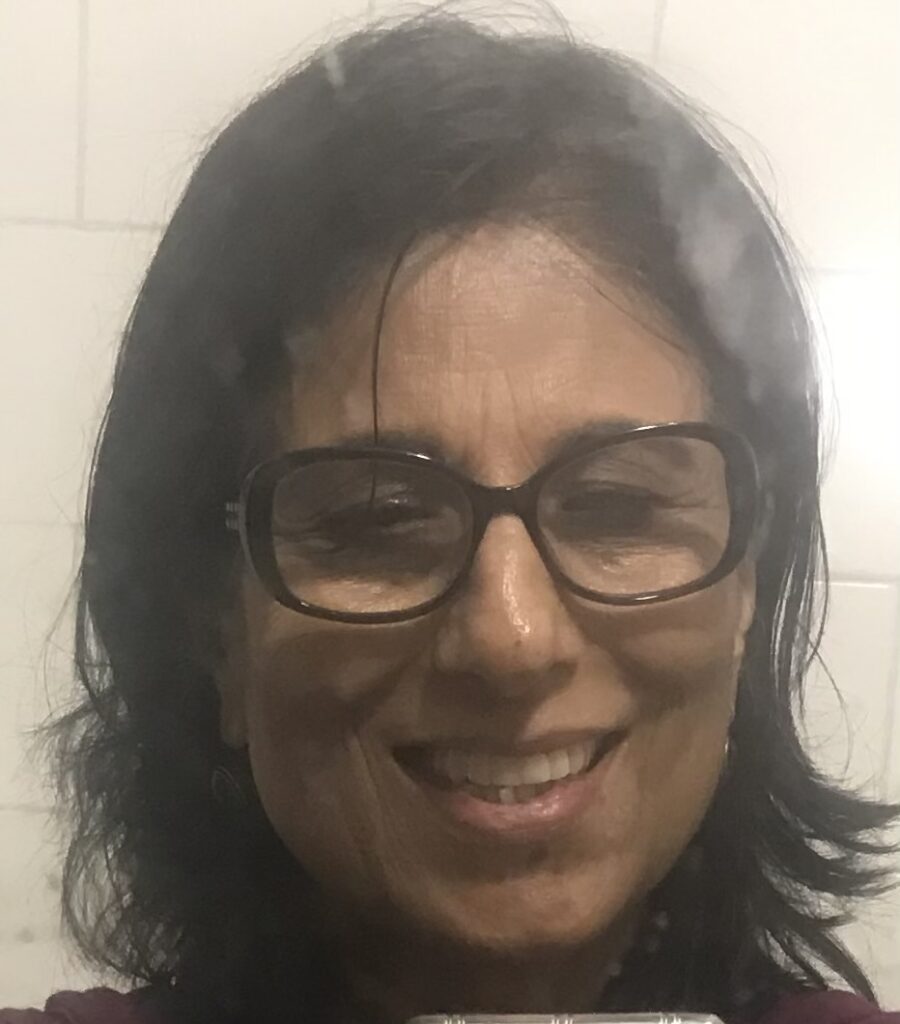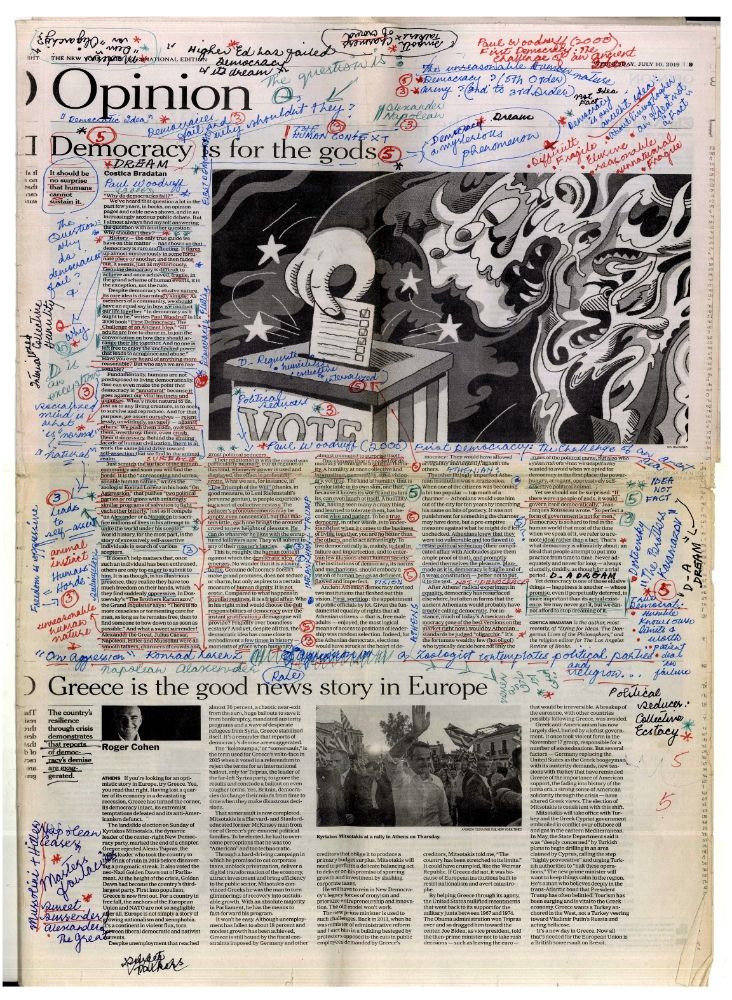Shabnam Syed Khan

Contribution Background. Collective Memory-Work (CMW) is central to the new pedagogy, “Consciousness Curriculum-(CC),” I have been experimenting in different learning and teaching situations. CMW as a research method works wonderfully for the CC propelled research methodology “I-Thou” I have developed and have been applying in my teaching and art practice. Because, trained as an art educator and change practitioner, I take the pleas of decolonization in 21st century as a call for intrinsic change at two levels: 1) Conceptual: universalist neo-liberal (capitalist) conceptualizations have lost efficacyi 2) Human: likewise most people don’t possess the psychological capacity to meet the unprecedented 21st-century opportunities and challengesii. CMW as the data collection method in “I-Thou” research methodology–in which the collection of opposing views on an issue is the backbone–is tested as a methodological tool to liberate, as the vignette of “I-Thou,” the colonized minds from the time-tested ideological, institutional, and mental configurations.iii From their hegemonic culture-meanings and the compulsions of being politically correct to honor internal or ordinary meaning-makings. In this collective inward probing it is discovered that how resiliently we strengthen the hegemonies of culture-meanings due to our Immunity-to-Change.iv For lack of psychological capacity or consciousness (colonized minds) we shirk from thinking differently and creatively.
Contribution philosophy. “I-Thou” derives its philosophical moorings–the significance of the “other” or the adversary’s opinions—from the teachings of the historical sages Jalaluddin Rumi,v Martin Bubervi and contemporary Laureate Daniel Kahneman.vii From CMW, the scope to experiment and respect for “everyday language” and “personal experience,” which addresses well the “I-Thou” aim of honoring the ordinary.viii The functional philosophy is appropriated from the Kegan-Lahey Immunity-to- Change (ITC) Mapping, which is a tested mechanism for the development of a higher order of psychological capacity – the consciousness the 21st Century polarized world needs to mediate disagreements and to reconfigure spent subjectivities, ideologies and institutions. ix
Contribution prompt. I would like to share my CMW experimentation with the 2025 Symposium participants—from hereon co-contributors: the “participants” (Thou/you/Other) and the “contributor” (I) would merge to erase the distinction between participants and contributor to become co-contributors (I-Thou). Towards this, the digital version (a video) of one of my CC interactive installations “Democracy is an unfulfilled Ideal” will be projected for the Symposium’s co-contributors. It comprises of:
- A video comprising of a newspaper Opinion page (see below), illustrating the column, “Democracy is for the gods.”x With my comments in colored markers.xi And a spool of slides projecting the close-ups of the notations I made on the newspaper.
- A two-column “Consciousness Handout.”xii
- A research question (RQ):Is democracy only voting?
Since the question, due to the current geopolitics across the Global North and Global South, is being globally addressed in media, it is imagined to interest all the co-contributors, and may elicit culturally dominant and unfamiliar memory-scenes about the phenomenon of democracy.
Contribution proceedings. During the 90 minute session the co-contributors will watch the video of the installation “Democracy is an unfulfilled Ideal” while I’ll read loudly the column “Democracy is for the gods.” The volunteers among other co-contributors may also join in loud reading during the second round of the reading.xiii
- The co-contributors will first do memory-work individually, during the free moments in-between the reading of one paragraph to the next on the hard copy of the newspaper column.
- Then the co-contributors will get themselves divided into small groups of at least three.
- The groups may begin collective conversation leading to collaborative memory-work by asking the RQ: “Is democracy only voting?’’’
- Then the co-contributors’ small groups will share their memory-scenes or the stories; noted on the “Consciousness Handout” to eventually arrive at some collective stories about the RQ.
- It is expected that the groups may come up with multiple and divergent stories about democracy they conjure from personal experience. They’d write them in the “Consciousness Handout.”
- Then the groups will merge into larger group and share the small group stories [written on the “Consciousness Handout).
- A discussion will follow.
- During the discussion I will volunteer to take notes of the large-group stories.
- Then the volunteer co-contributors will read the outstanding texts or the stories, leading to new narratives; the co-contributors will collectively investigate to track down through another round of discussion among the small groups the two outstanding opposing streaks of the memory-scenes that the group has collected around the session RQ and generally the theme “democracy.” They’ll note them in the “Consciousness Handout” to track any signs of change in their perception of the session theme.
Speculations. The last component of the 90-minute session will be entitled “Speculations” where the session co-contributors will apprise (referring to the entries on the “Consciousness Handout” and the artwork) each other about where they are with regard to their meaning-makings about the session’s question and the theme “democracy.”xiv If they were able to deconstruct the culturally ready meaning of “democracy.” To be kind of unfettered from the hegemony of the meanings that cultures have ordained to democracy. As a motley group of contributors we’d clarify our own conceptions, not necessarily to arrive at some conclusive constituents of democracy, but as a re-constructive group the session would be availed as a nudge towards self-awareness of one’s own and the others’ meaning-makings of democracy–conflictual and harmonious.
Towards the end, I will again become the “contributor” and the group “symposium participants.” The participants will give feedback, a CMW novice, on my usage of the CMW. The ensuing ideas may assist all of us to discover the potential of CMW as the decolonizing pedagogy, and perhaps thereby feel the whiff of what it is to be free from the powerful grip of the so-called authentic conceptualizations, the exhilaration of being politically incorrect, and to feel confident in using ordinary vocabulary to be oneself elaborating the supposedly erudite concepts.
I look forward that the feedback from the participants will assist me to further speculate and experiment the CMW as a decolonizing pedagogy. A pedagogy towards qualitative mindset change, when learning/research are deliberately devised as consciousness inducing mechanisms for personal and group change.
Installation image:

i e.g. higher education; creativity; art; democracy; gender discrimination; women’s empowerment; developed and under-developed worlds.
ii e.g. technology; profusion of information; global warming.
iii e.g. higher education, art, female empowerment, developed and underdeveloped worlds, democracy.
iv Kegan and Lahey. (2009).Immunity to Change: How to Overcome it and Unlock the Potential in Yourself and Your Organization. Harvard Business Review Press.
v Idries Shah. (1983). The Sufis. The Octagon Press
vi Martin Buber. I and Thou. https://openlibrary.org/books/OL16653366M/I_and_thou
vii The Nobel Winner Who Liked to Collaborate With His Adversaries.(April 1, 2024).New York Times. https://www.nytimes.com/2024/04/01/opinion/nobel-daniel-kahneman-collaboration.html
viii Haug, F. (1999). Memory-work as a method of social science research: A detailed rendering of memory-work method. chrome-extension://efaidnbmnnnibpcajpcglclefindmkaj/http://www.friggahaug.inkrit.de/documents/memorywork-researchguidei7.pd
ix Hamm, R. (2018). Collective Memory-Work–a Method Under the Radar?. Other Education, 7(2), 118-124
x (New York Times, Costica Bradaton, (July 10, 2019).
xi Participants will have the hard copies of the newspaper page (installation).
xii To record the recurring thoughts of the co-contributors.
xiii They will all have a hard copy (without the comments) of “Democracy is for the gods” and individual copies of the one-page “Consciousness Handout.”
xiv “Consciousness Handout” has an inbuilt mechanism to facilitate structured critique; the group will have in black and white their own experience of not only the session contribution, but of self-change as well